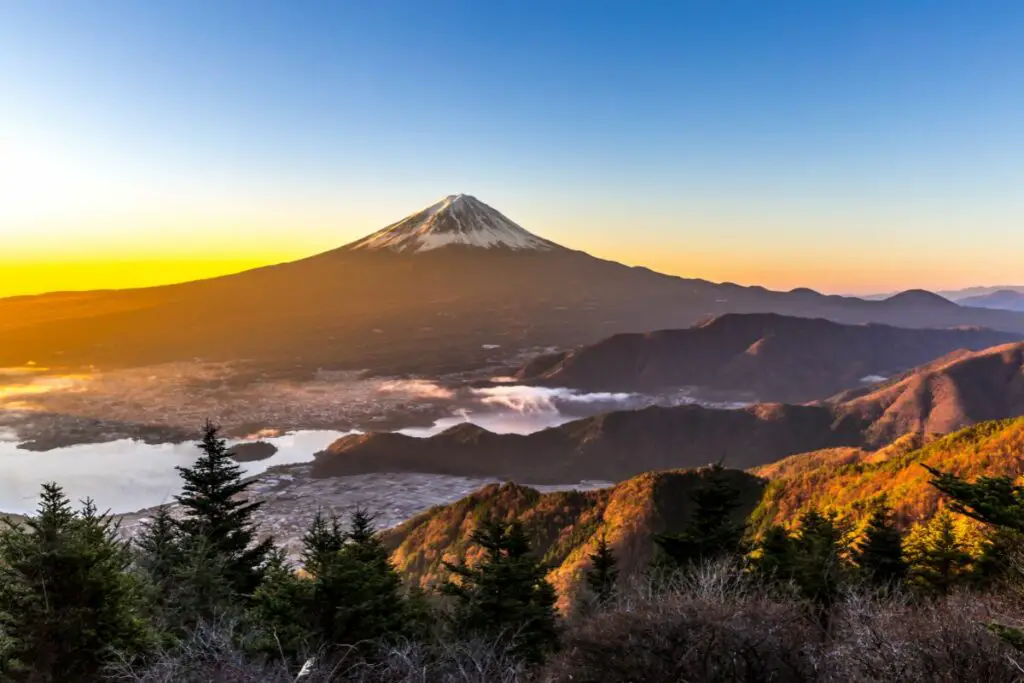Japan has to be one of the most culture-rich countries on the planet. With so many notable features from food to music. But with all of the culture we know today, there is also a lot of cultures that may have been forgotten by a lot of the people in the modern world.

One of the main names that Japan is given is the Land of the Rising Sun. But why is the Asian country given this name? And what does it mean with their rich culture and history?
We’ve looked into the Japanese stories and found out more. Keep reading to learn about Japan and its name The Land of The Rising Sun.
The Land Of The Rising Sun
In sometime between the 7th Century and the 8th Century, Japan changed its name from Wakoku to Nihon. It’s not fully known why this happened but some records suggest that the Japanese envoy to China asked for the change because he wasn’t a fan of it.
However, other records suggest that the Chinese Empress, Wu Zetian, commanded the country to change its name.
Nihon, the former name of Japan, means ‘origin of the sun’ in kanji. This may be because the sun rises in the East and sets in the West.
So from China’s point of view, the sun appears in the direction of Japan, before lighting up the sky. This also supports Japan’s stories about the sun goddess Amaterasu.
The Japanese national flag is displayed as a white, rectangular banner with a red-crimson circle in the middle.
Officially named the Nisshoki, translating to ‘flag of the sun’, this flag has become a national beacon of pride and hope, symbolizing the rising sun over the ancient lands of Japan.
The Japanese refer to their country as the Land of the Rising Sun because they see Japan as the first country in the world to see sunlight once the Sun has risen. Their people are proud of the Sun shining across the country and glowing through the cities of Tokyo and Kyoto (see also ‘How Far Is Tokyo To Kyoto?‘).
Who Is Amaterasu?
Amaterasu is also known as Amaterasu Omikami in Japanese, translating to Great Divinity Illuminating Heaven. She is the celestial sun goddess, which the Japanese imperial family claims to descend from.
Amaterasu is an important Shinto deity and plays a huge role in Japanese culture and history. This sun goddess had a brother called Tsukuyomi, to whom she was married (see also ‘What Age Can You Get Married In Japan?‘). He was the god of the moon and is also regarded as a vital part of Japan’s historical cultures and ideals.
The stories of Amaterasu date back to early records in the depths of Japan’s ancient history (see also, ‘When did the Mongols Invade Japan?‘). It’s believed to originate in the Kojiki, in 680 AD and the Nihon Shoki, in 720 AD.
Along with her brothers Tsukuyomi and Susanoo, the gods of the moon and the storms and sea, respectively, Amaterasu and her siblings are believed to have painted the ancient Japanese landscape.
Facts About Japan
Below we have some interesting facts about Japan for you to enjoy!
Japan Has The 11th Largest Population In The World
Although the Asian country seems like it wouldn’t have that large of a population due to being scattered over lots of different islands, Japan sits just outside of the top ten countries in the world for population rates.
However, the country has seen its number declining since 2001 due to low birth rates and expensive childcare. Despite this, there are believed to be over 126 million people residing in Japan.
Their Average Life Span Is 2nd Highest In The World!
Behind only Hong Kong, Japan has an average life expectancy of 84 years old. This could be down to healthy lifestyles and advanced medical care in the modern-day world.
Japanese Melons Can Cost Over $200 Each
Yep, you read that right! Japanese melons are so expensive because they play a huge role in gift-giving throughout the country, which is a culture that’s hugely respected all over Japan.
Samurai would offer tangerines and melons to their shogun, or rulers of the country, as a token of appreciation.
Remove Your Shoes, Please!
When it comes to the old tradition of removing shoes indoors, the Japanese have been ahead of the curve for centuries. The entrances of houses in Japan, called genkan, indicate when it’s best to remove your footwear to show respect in someone’s home.
These entranceways have lowered floors to help indicate where you should remove your shoes.
Eating Noodles Loudly Is A Sign Of Enjoyment!
When eating at home, a lot of people may get frustrated if you eat loudly, however, in Japan, this is not the case.
Slurping your noodles loudly can show that you’re enjoying your meal and that the food is going down well (see also ‘What Are Somen Noodles?’)! By aerating the food as you consume, it’s said that this technique even adds extra flavor to the food!
Frequently Asked Questions
Get your last-minute questions answered here!
What Is Japan Famous For?
The ancient Asian country is famous for many things, from sushi to cherry blossom trees (see also ‘Are Bonsai Trees Real?‘). On top of this, there are also world-famous landmarks throughout the beautiful country like Mount Fuji.
On top of this, their advanced technology and famous brands such as Nintendo and Toyota are used worldwide every day.
What Religion Is Japan?
The traditional religion of Japan is typically regarded as Shinto – the country’s most ancient religion.
Other Japanese religions include Buddhism and Confucianism, with Buddhism being seen in many Asian territories and countries. Christianity is only a minor movement in the Asian islands.
How Old Is Japan?
It’s thought that Japan has been inhabited since around 30,000 BC, in the Upper Paleolithic period.
Records suggest, however, that the first written mention of the archipelago features in a Chinese chronicle called the Book of Han. This literary piece was finished in the 2nd Century AD.
Final Thoughts
When it comes to Japanese history, there is simply too much to talk about. The history is rich and filled with culture, with thousands of different eras and talking points.
Amaterasu and her siblings are a huge part of Japanese history and are believed to play a massive role in Japanese mythology stories. Japan is called the Land of the Rising Sun because it is believed to be the first country that the Sun rises over, residing in the far East of Asia’s lands.








